If this works for you and your baby its fine to give baby a rollover feed. But those snoozes come in random bursts of slumber.
 Sleep Regression In Babies And Toddlers Babycenter
Sleep Regression In Babies And Toddlers Babycenter
At 3-4 months the sleep patterns of a newborn begin to mature.
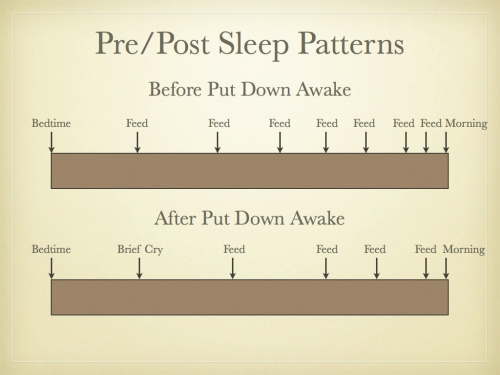
Baby reverting sleep patterns. Regular 4-6 Time Awake Between Naps. Baby sleep patterns are shaped by a mix of genetic and environmental factors. Babies ages 4-12 months on average sleep 135-15 hours during a 24-hour period.
A newborns sleep pattern is often very long in duration usually they will only wake. Heraghty et al 2008. How long do newborn babies sleep for.
Your babys sleep patterns will change pretty significantly in the first year too. The amount of active sleep starts to decrease and sleep cycles lengthen. Just when youre getting excited about sleeping through the night and waking up feeling refreshed you start to notice that your little one is reverting back to sleep patterns from months ago.
In the first 11 weeks your babys. It could be a warning sign of an ear infection. But around 4 months of age you may see a brief return to more nighttime wake-ups as your baby works on developing more adult sleep patterns.
Newborns sleep a lot 14 to 17 hours a day or about 70 percent of the time. Newborn babies sleep from 11 to 16 hours a day at all hours of the day and night. Babies sleep a lot.
And if your baby is awake so are you. If your babys sleep pattern changes suddenly check for symptoms of illness. Most parents of babies under six months of age are still getting up in the night to feed and settle their babies.
Here we look at the average amount of sleep a baby has. Sleep regression is the time when your babys sleep patterns shift they wake up often during the night and they have a hard time going back to sleep. Sleep Regression simple means your toddler will no longer keep to their established sleeping pattern.
Your babys sleep patterns may be unpredictable for a while and theres no need to put him on a sleep schedule just yet though there are some things you can do to encourage good sleep habits. Newborn to 3 months. Total Hours of Sleep in 24 Hour Period.
Exposure to natural light during daytime activities can help establish a sleep-wake pattern for your baby that more closely corresponds to the day-night cycle making it more likely for them to sleep through the night. Over the first few months of life this generally irons itself out and parents Read More 5 Month Sleep Regression. However sleep regression in an 18-month-old baby can be challenging for the parents since the baby can escape from the crib walk around make sounds or play.
Your baby is not on any kind of schedule at least not yet. Baby Sleep Patterns in the First Year. Newborn sleep patterns the coming weeks and months Maturation of newborn sleep patterns and cycles.
How our babies sleep needs and patterns change in the first 12 months of life. And thats what were exploring in todays blog article. They couldnt get to sleep or stay asleep on their own.
Baby sleep patterns by age. Expect sleep patterns and nap schedules to change with age. Dont worry if your baby doesnt fit into the pattern we describe it doesnt mean that there is anything wrong with your baby or that you are doing something wrong.
68 months 14 hours. A healthy sleep pattern is essential for optimal growth and development. Or it may simply be a new turn in their development.
Your toddler could go from sleeping just fine to reverting back to a newborn hence the term regression. Its called sleep regression and it can happen at 19 months. Heres what you need to know about your babys sleep.
First the good news for exhausted parents. Sleep is essential for your babys optimal growth and development. During the first year its normal for your baby to wake up between four and six times a night Montgomery says.
Your newborn had certain sleep patterns that more or less caused chaos in your own sleep schedule. This means the sleep pattern changes including less sleep or changed sleep pattern. 0-6 Weeks Newborn Sleep Schedule.
Theyll sleep for around 16 to 18 hours in every 24 Elias et al 1986. Even implementing all these tips your eight-month-old may still have sleeping problems. For many this keeps going after six months.
How baby sleep patterns affect grown-ups. Touchette et al 2013. Often Late.
In fact for the first few weeks babies sleep for most of the day and night. Sleep Patterns from Birth 3 Months. This development often brings the first major sleep regression.
For instance in two studies of 6-month old babies almost half the individual variation in nighttime sleep duration could be explained by genetic factors Dionne et al 2015. 5 Month Sleep Regression A sleep regression is a common occurrence for infants. But how much sleep will you get with a newborn.
Sample sleep schedules by age. That doesnt mean you cant help your little night owl get. By the age of 19 months sleep regression can become a difficult experience because it.
If they wake up in the middle of the. No two baby sleep patterns are identical some sleep for long periods others in short bursts. Number of Daytime Naps.
The temporary condition often resolves within a few weeks. Baby Sleep Patterns by Age.
With some luck your baby might start to sleep for longer stretches at night from about 6 weeks of age. Babies under 12 months.
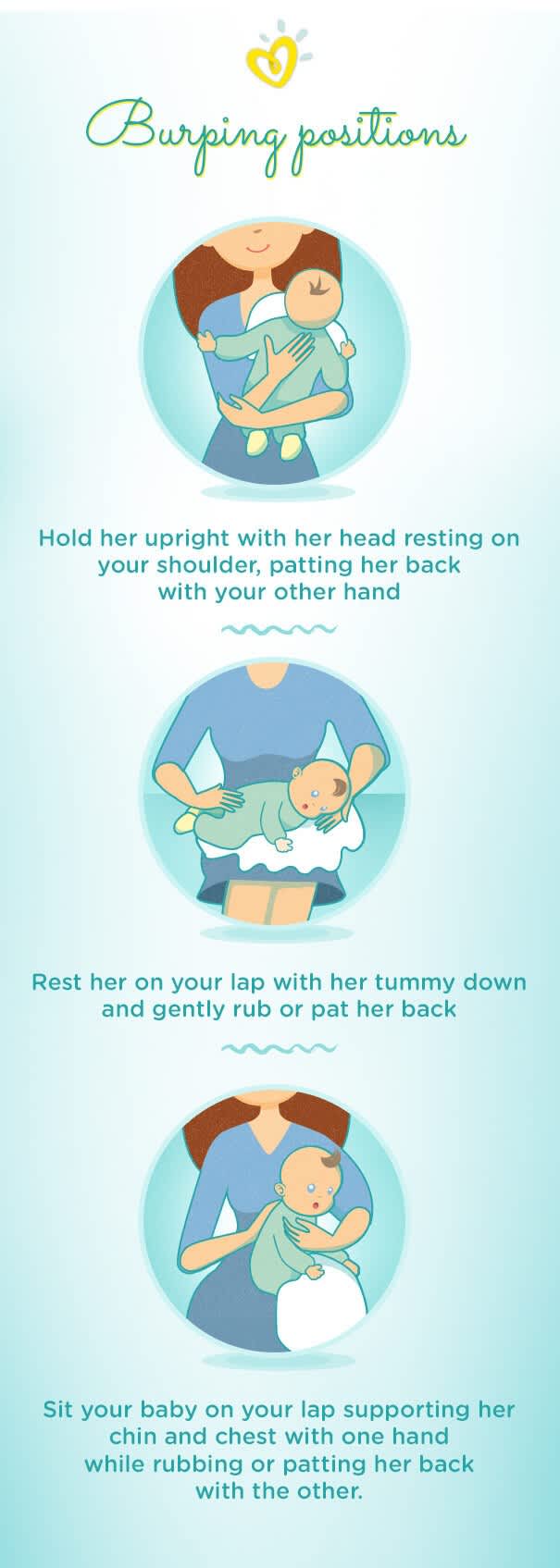 1 Month Old Baby Milestones Sleep Feeding Schedule Pampers
1 Month Old Baby Milestones Sleep Feeding Schedule Pampers
Then establish a set routine to go through each night such as bath then story then lullaby then dim the lights for sleep.
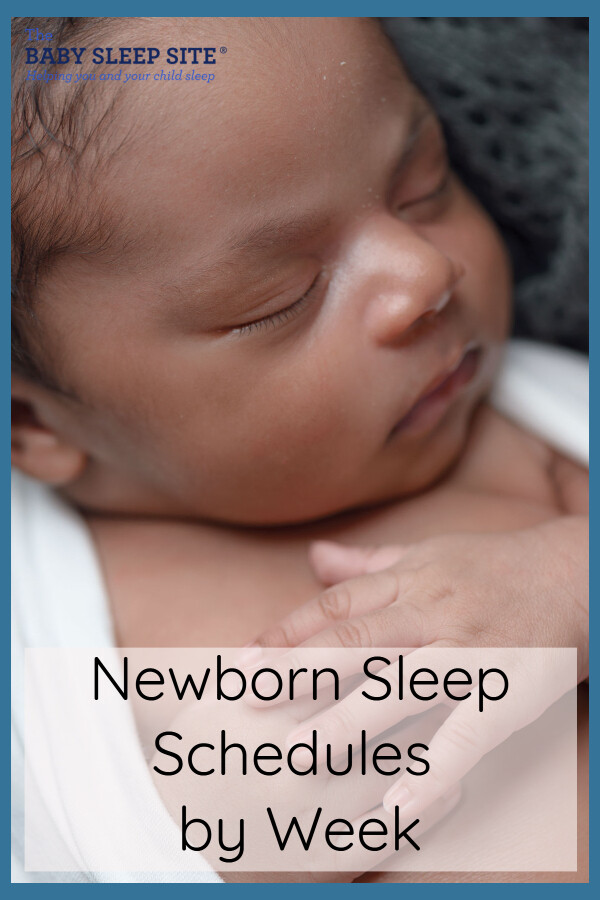
1 month old infant sleep patterns. For the first month you can usually expect your baby to sleep for most of the day. But they may not sleep more than 1 to 2 hours at a time. Unpredictable sleep patterns are also due to nutritional needs.
My 1 month old baby has gotten herself into a semi routine by herself something like awake at 730-8 bottle between 60-120mls usually around 90 play sleep at 9 awake at 11 bottle play asleep at 1230 awake at 3 bottle play sometimes asleep at 5 but often stays awake grumpy till bottle at 6ish bath every second night sleep at around 730 awake at 1130 bottle straight back to sleep one or two dream feeds anywhere between 130-530 and awake again around 730. Also known as a sleepwake cycle a circadian rhythm is an internal 24-hour clock that cycles at regular times between sleepiness and alertness. Sleep cycles typically last about 45 minutes to an hour for newborns.
Newborns generally sleep for 16-20 hours in a 24-hour period but they wake every 2-4 hours to be fed. Your babys sleep patterns will change pretty significantly in the first year too. So find a good time for your baby to go down - ideally between 630pm and 830pm - and try and stick to it each night or as near as possible.
It is normal for a 6-month-old to wake up during the night but go back to sleep after a few minutes. From 2 weeks to 2 months of age they sleep an average of 155-17 hours total about 85-10 hours at night and six to seven hours during the day spread out over three to four naps. I know every baby is different but wondering how many hours in a stretch your one month old sleeps at night.
While newborns sleep about 16 to 17 hours per day they may only sleep 1 or 2 hours at a time. She is BF with supplemented F. One-month-old babies typically sleep about 15 to 16 hours per day.
Your baby could sleep for as long as up to 18 hours in a span of 24 hours in a day. They tend to sleep the longest period at night averaging about 11 hours. You might be feeling super tired but there is light at the end of the tunnel.
After your baby is born your newborn will mostly sleep for the first few weeks. Theyre still learning to tell the difference between day and night. As babies get older they need less sleep.
My 1 mo old dd doesnt seem to sleep for longer than 25-3 hrs at a time day or night. How Much Sleep Does a 1-Month-Old Get. Over time your babys sleep cycle will slowly get closer to yours.
0-10 minutes they start to fall asleep 10 to 20 minutes they are getting into deeper sleep 20 to 30 minutes they are heavily asleep 30 to 40 minutes they are coming out of heavy sleep and 40 to 50 or 60 minutes they are in light sleep and easy to wake up. Newborns havent yet developed their circadian rhythm. But around 4 months of age you may see a brief return to more nighttime wake-ups as your baby works on developing more adult sleep patterns.
She sleeps from 930ish-11 pm I wake her up to give her a bottle back to sleep at 1130-200 or 230 dd then gets up to nurse. A 1 month old sleep schedule usually begins at about 7 AM. Its even possible for some 18-month-olds to show notable improvement in sleep.
Their naps are usually about 1 to 2 hours. And thats not all between birth and 12 months your baby will learn to roll over sit up creep and crawl and perhaps even walk. In general theyre morning wakers so you should expect this general time for the start of your own day with an infant.
At this age babies sleep about 14 to 17 hours a day including about five naps during the day. During the initial weeks a newborn babys sleeping time pattern can be divided into 50 active sleep and 50 quiet sleep. How its split up throughout the day depends on the baby but around three daytime naps is pretty typical with eight-and-a-half hours of sleep probably come at night with interruptions of course.
Your 1 Month Old Baby Sleep Patterns. Most babies dont start sleeping through the night 6 to 8 hours without waking until they are about 3 months old or until they weigh 12 to 13 pounds. 1 month old sleep patterns.
However different babies have different sleep needs. How Much Sleep Does a 1-Month-Old Baby Need. They need lots of feeds because they have tiny tummies.
Their environment will also play a part in the quality of their sleep. Your baby will start dropping their number of daytime naps to about 2. At this age your babys circadian rhythm is fully developed but still immature.
For this reason its best to understand sleep regressions as phases that can occur during the development of any child but not something that is destined to occur for every child at a specific point in time. Its normal for babies to have irregular sleep patterns from birth to 3 months. In general babies may wake up less frequently during the night because they dont need to be fed as often.
Generally newborns sleep about 8 to 9 hours in the daytime and about 8 hours at night. The average baby triples his birthweight by age 1 and grows an incredible 10 inches in that first year. Nighttime sleep is generally 105-12 hours which may include 1-2 overnight feedings.
Here are examples of typical sleep patterns and schedules for babies by age its ok if your babys sleep needs and patterns vary from these examples. Babies do not have regular sleep cycles until about 6 months of age. Knowing these basics helps you know when you need to adjust a 1 month old sleep schedule.
0-3 months Most newborns dont have definite day and night sleep patterns. Sleep patterns unfold differently for every child so toddlers may face problems before or after the 18-month mark. A 1-month-old babys sleep patterns will be different from a 6-month-old babys sleep schedule.
For the first few months your baby will sleep and wake up at all hours of the day and night. Newborn babies have quite a range in total sleep time 10-18 hours per day with sleep usually equally spaced throughout the day with no real difference between day and night time sleep.
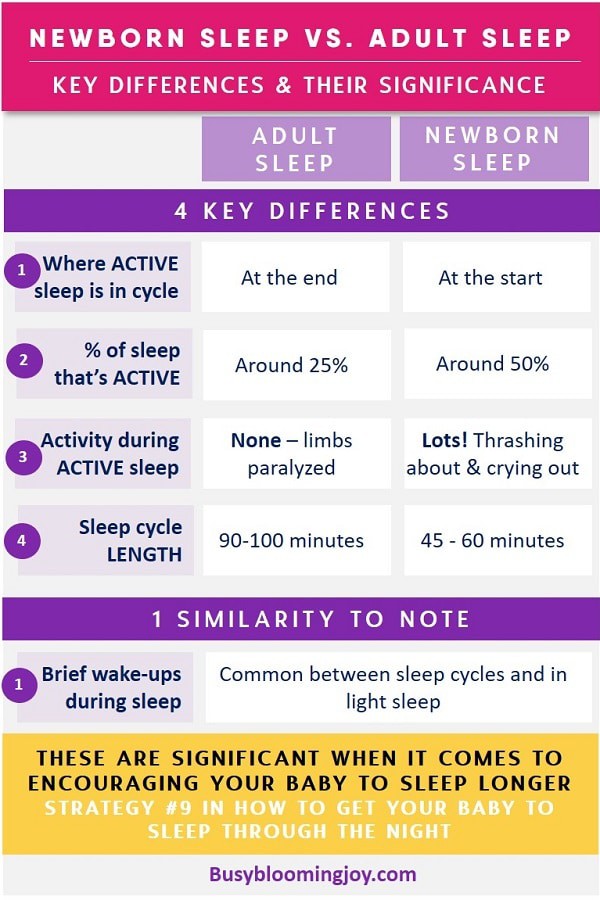 Newborn Sleep The Ultimate Guide Must Know Facts For Healthy Baby Sleep
Newborn Sleep The Ultimate Guide Must Know Facts For Healthy Baby Sleep
For example consider these points.
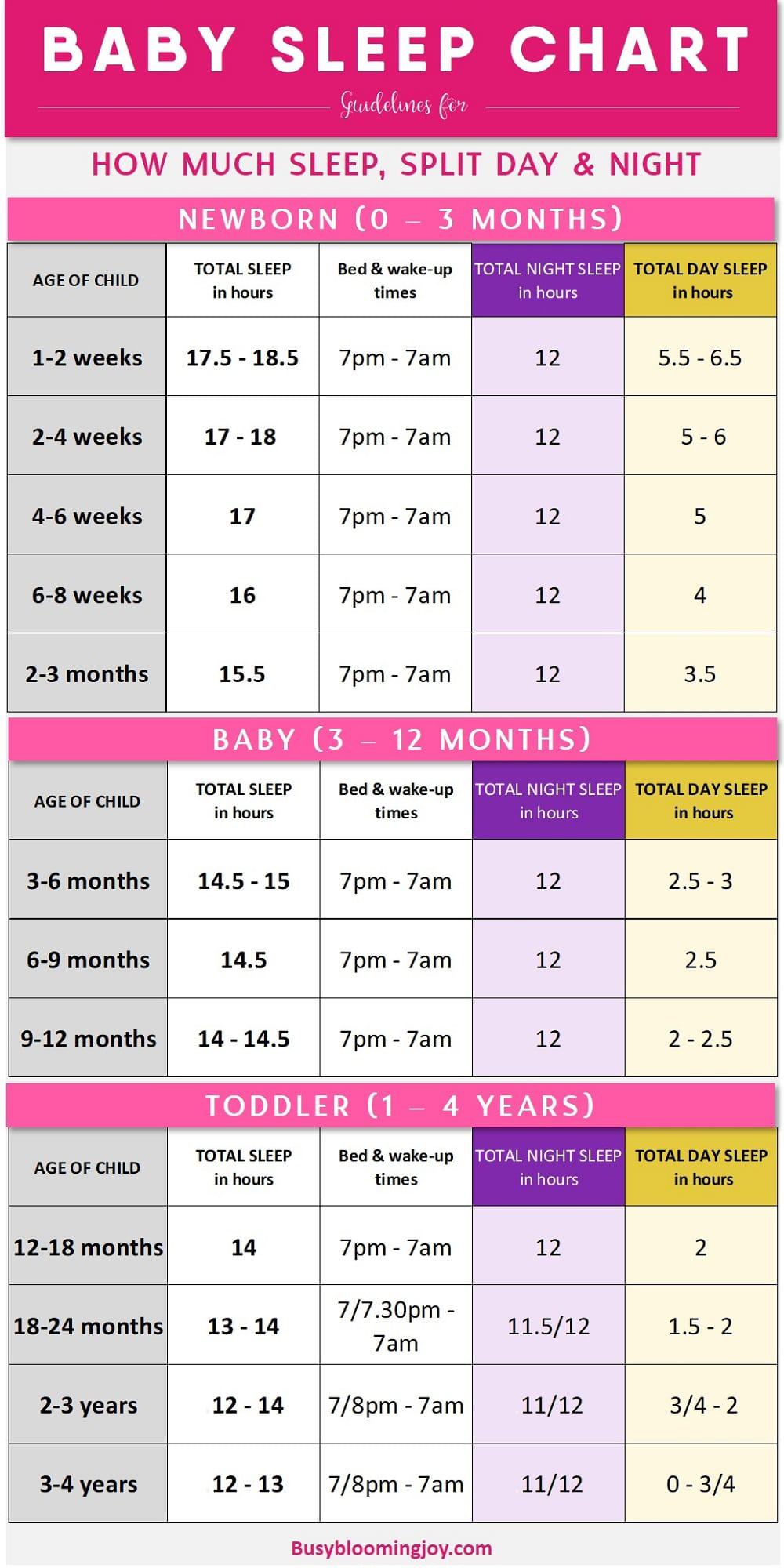
Newborn sleep patterns. Sleep cycles typically last about 45 minutes to an hour for newborns. Newborns generally sleep very lightly. Also a newborn has not learnt to sleep when it is dark.
During this period your newborns sleep patterns will look nothing like yours. Caring for your newborn brings great joy and excitement but with it also comes sleep deprivation. But this can vary a lot.
Generally newborns sleep a total of about 8 to 9 hours in the daytime and a total of about 8 hours at night. How long do newborn babies sleep for. Parents are often wondering about baby sleep patterns especially when this is their first time to have a baby in the house.
They spend half of their sleeping time in active sleep. Sleep Patterns from 3 6 Months By 3 or 4 months of age your baby is officially out of the newborn stage and you may notice that your little ones sleep is slowly starting to organize itself into shorter daytime naps and longer periods of night sleep although again not all babies do this by 3 months. Their sleep is interspersed with feedings.
But this can vary a lot. But around 4 months of age you may see a brief return to more nighttime wake-ups as your baby works on developing more adult sleep patterns. To the sleepless parent newborn sleep might seem totally disorganized.
Newborns sleep in short bouts typically ranging from 30 minutes to 4 hours at seemingly random times throughout the day and night. Just as with adults babies and childrens sleep patterns vary. A baby is considered a newborn from birth until about 3 months of age.
Theyll sleep for around 16 to 18 hours in every 24. Generally newborns sleep a total of about 8 to 9 hours in the daytime and a total of about 8 hours at night. When babies are around three months of age the sleep pattern can be divided into light sleep and deep sleep cycles.
Newborn sleep patterns the first week Sleep is about all newborns seem to do the first week. Sleep patterns of a newborn till 3 months old. The good news is that based on newborn sleep patterns babies typically sleep much of the morning and at night with being awake every few hours just to feed.
Its normal for babies to have irregular sleep patterns from birth to 3 months. They will often wake up after the active sleep phases. Most newborn babies are asleep more than they are awake.
Most babies dont begin sleeping through the night 6 to 8 hours until at least 3 months of age. The good news is. 68 months 14 hours.
From birth some babies need more or less sleep than others. Breast fed babies feed every 2-3 hours while formula fed babies may feed every 3-4 hours. Newborns never sleep for long.
Generally newborns sleep about 8 to 9 hours in the daytime and about 8 hours at night. This is because they have tiny tummies which can take very little. Newborn Infant Baby Sleep Pattern.
However this varies considerably and some babies do not sleep through the night until closer to 1 year. Understanding Newborn Sleep Patterns. A developmental timeline of baby sleep patterns 0-3 months.
Whether its day or night they just sleep. As the days pass they gradually develop a tendency to sleep more at night. Of course there are frequent intervals to feed so sleeps range from 20 minutes to 4 hours.
Most babies dont start sleeping through the night 6 to 8 hours until at least 3 months of age. But because they have a small stomach they must wake every few hours to eat. Babies sleep a lot.
Also known as a sleepwake cycle a circadian rhythm is an internal 24-hour clock that cycles at regular times between sleepiness and alertness. Most newborn babies need to feed every 2-4 hours. Most babies do not begin sleeping through the night 6 to 8 hours without waking until at least 3 months of age or until they weigh 12 to 13 pounds.
Unpredictable sleep patterns are also due to nutritional needs. Your baby will sleep in short bursts anywhere from 30 or 45 minutes to 3 or possibly 4 hours and then eat between periods of sleep. Newborns sleep in short bouts scattered throughout the 24-hour day.
But because they have a small stomach they must wake every few hours to eat. In fact for the first few weeks babies sleep for most of the day and night. They usually start to learn this rhythm of day and night when they are about 6 weeks old.
0-10 minutes they start to fall asleep 10 to 20 minutes they are getting into deeper sleep 20 to 30 minutes they are heavily asleep 30 to 40 minutes they are coming out of heavy sleep and 40 to 50 or 60 minutes they are in light sleep and easy to wake up. Newborns simply cant sleep through the night -- so neither can you. During the initial weeks a newborn babys sleeping time pattern can be divided into 50 active sleep and 50 quiet sleep.
The list below shows the average amount of sleep babies and children need during a 24-hour period including daytime naps. Newborns havent yet developed their circadian rhythm. A newborn baby sleeps for 16 or more hours a day.
Total hrs of sleep in a 24-hr period 12 to 15 hours. At 6 months babies need an average of 11 hours of uninterrupted sleep each night and 35 hours of daytime naps.
 3 Month Old Sleep Schedule Expectations 3 Month Old Sleep Baby Naps Schedule Baby Month By Month
3 Month Old Sleep Schedule Expectations 3 Month Old Sleep Baby Naps Schedule Baby Month By Month
Instead of a long nap it is reasonable to divide these hours into 2 to 4 intervals.
6 month old baby sleep patterns. 7 to 8 AM. Your babys sleep patterns. Some babies will sleep more during the day and less at night.
Some infants sleep for stretches of up to eight hours at night as early as a few weeks old but many wont sleep this long until theyre older. Babies will sleep four to five hours during the day spread out over three naps. Your 6 month old should also be taking 2-3 naps per day for a total of 2-3 hours of sleep in total.
These phases a temporary interruption in your babys sleep routine often coincide with developmental milestones. At this age the babys daytime sleeping hours could increase or decrease by an hour. 6 to 12 months - From 6 months your baby will drop the night feed at some point and start to sleep through the night for up to 12 hours.
But that doesnt mean your baby will. By the third month you will start understanding your babys sleep pattern to an extent even though it may not be as regular as you want it to be. If your baby has transitioned to two naps this early they might have a single 4-hour awake period before bedtime.
The baby also sleeps for three and a half hours during the day across two naps. And generally speaking some babies may need more or less than the average. Many babies this age consolidate their daytime sleep from three naps to two one in the morning and one in the afternoon.
Usually by 6 months most - but not all - babies are capable of sleeping for 8 to 12 hours with brief awakenings but no feedings during the night. Your 3 Month Old Baby Sleep Patterns. Typical baby sleep schedule for this age.
Touchette et al 2013. 6 Month Sleep Regression. Thats a big change from the sleep patterns theyve had in the first three months.
Your day should start around. Some 6-month olds still need feedings at night so the nighttime sleep is not always uninterrupted. 4 to 6-month-old sleep schedule.
Look a bit more like an adults - except for the naps. Daytime sleep is generally 3-4 hours spanned through 3-4 naps. In this example sleep schedule the six-month-old baby sleeps for two and a half hours at night wakes up to eat then sleeps for seven more hours uninterrupted at night.
Usually 3 naps each 1 to 3 hours long. For instance in two studies of 6-month old babies almost half the individual variation in nighttime sleep duration could be explained by genetic factors Dionne et al 2015. Between 3-6 month-old babies generally have around 35 hours of daytime sleep spread across 3 naps and need 2-25 hours of awake time between each nap.
They will also usually nap at least twice during the day for up to 2 hours at a time. This was so they could track the babies sleep patterns and measure the longest period of uninterrupted sleep they had each night. So at four months a baby may sleep for 10 hours at night while that could increase to 11 hours by six months.
At this age your babys circadian rhythm is fully developed but still immature. Nighttime sleep is generally 105-12 hours which may include 1-2 overnight feedings. Your 6-month old baby likely needs 11-12 hours of sleep at night and 2-3 hours of sleep during the day.
Most babies of this age are starting to stay asleep for longer stretches at a time a process known as sleep consolidation. At 6 months your baby is experiencing a whole host of changes mastering rolling over and learning how to sit up babble and maybe even crawl. Babys Sleep Patterns The study involved 44 babieswhen they were 6-months-old.
By the time your baby is three months old he will need about 15 hours of sleep over a span of 24 hours. Most babies this age can stay awake 2 to 2 12 hours at a time sometimes 3 hours. At six months of age it is recommended 1 that infants get between 12 and 15 total hours of sleep per day.
To minimize the emergence of teeth from cutting into your babys sleep ask your pediatrician about pain relieving options. Sleeping Pattern of a Six Month Old Baby When the baby is six months old experts recommend that they should get at least 2 to 3 hours of nap every day. Most 6- to 9-month-olds sleep 14 to 15 hours a day between nighttime sleep and naps and are capable of sleeping for long stretches at a time.
Cutting of Teeth Ouch It is common for babies to begin teething around six months after birth if I had teeth cutting through my gums Id probably have trouble catching some zzzs too. Baby sleep patterns are shaped by a mix of genetic and environmental factors. Babies at this age need about 12 hours sleep overnight.
Researchers asked the mothers to record an infant sleep diary for 13 nights.
Waiting until babies fall into a deeper sleep before putting them down can help them stay asleep. All told 72 of the babies showed erratic sleep behaviors for the two weeks.
 Newborn Sleep Patterns A Survival Guide
Newborn Sleep Patterns A Survival Guide
If you have a baby with irregular sleep patterns and youre currently struggling or make that pulling out your hair to help them sleep longer theres hope for you yet.
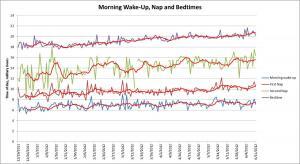
Baby erratic sleep patterns. Her sleep patterns will evolve as she grows. Often Late. Sleep Loss Dumb You Down.
Baby Sleep Patterns by Age. Baby sleep patterns are becoming more adult-like. Their eyes will move and their faces and bodies will twitch.
In a study tracking the sleep patterns of mothers from pregnancy through the postpartum period maternal sleep worsened after childbirth and continued to deteriorate until about 12 weeks postpartum Kang et al 2002-the time when newborn sleep patterns begin to show marked circadian rhythms Nishihara et al 2000. Newborns sleep 16 or more hours a day but often in stretches of just a few hours at a time. Number of Daytime Naps.
Newborn sleep patterns take their toll on parents. The most common ones are at 6 weeks 4 months and 6 months. Researchers recruited 44 6-month-old babies who were tracked for two weeks and learned that their sleeping patterns varied weekly sometimes daily.
For the first 6 to 8 weeks babies fall asleep dreaming and may continue dreaming for 15 or 30 minutes before they fall into deeper sleep. A babys sleep schedule is completely unique to each baby but there are some patterns that weve outlined here to help guide you through that first year. 0-6 weeks In the first few weeks a newborns sleep schedule will be irregular and erratic.
The birth of a baby brings in lots of responsibilities for the parents. What is meant by irregular sleep patterns. Its normal for babies to have irregular sleep patterns from birth to 3 months.
In addition babies are more likely to sleep for extended periods at night. Newborns havent yet developed their circadian rhythm. Irregular sleep pattern was defined as no regular bedtime or wake up schedule.
Infant sleeping patterns can be quite erratic preventing parents from having a good nights sleep. Heres what parents should know about newborn and baby sleep patterns. This usually lasts between two and six weeks.
Sleep regressions can happen at 3-4 months 8-10 months 12 months 18 months and 2 years. Here are five ways to. Total Hours of Sleep in 24 Hour Period.
By 3 or 4 months of age your baby is officially out of the newborn stage and you may notice that your little ones sleep is slowly starting to organize itself into shorter daytime naps and longer periods of night sleep although again not all babies do this by 3 months. Sleep Patterns from 3 6 Months. By age 3 to 4 months many babies sleep at least five hours at a time.
On average infants slept six hours. Although the pattern might be erratic at first a more consistent sleep schedule will emerge as your baby matures and can go longer between feedings. A sleep regression is a period of time when a baby who normally would sleep through the night all of a sudden stops.
Parents can see their babies dreaming. Babies wont develop regular sleep patterns until about 4 months--thats when they will be ready to sleep through the night regardless of what they were doing before. Right now theres probably only a sliver of light at the end of the tunnel but it will grow brighter.
Most did not even sleep for six straight hours half of the two weeks. In the meantime your babys erratic sleep patterns may mean that no one in the family is snoozing very soundly. However the babys sleeping patterns go through several changes till she adapts a normal sleeping pattern similar to that of adults.
If your baby suffers from acid reflux or has a cold that is affecting their nasal passages raising the head-end of their cot so as to tilt the child a little during sleep will afford them some relief. Make You Gaining Weight. Unpredictable sleep patterns are also due to nutritional needs.
Irregular Bedtime Ages Your Skin. Irregular bedtime Kills Sex Drive. Your baby sounds like a.
However if you believe your baby to be suffering from noticeably irregular breathing or he is gagging choking coughing severely grunting. Heres what to expect at each stage. A newborns sleep pattern is often very long in duration usually they will only wake up every few hours in order to feed.
Risk Factors for Irregular sleep patterns. 0-6 Weeks Newborn Sleep Schedule. The study conducted by the National Heart Lung and Blood Institute found that an irregular sleep pattern in older.
Can you die from an irregular sleeping pattern. Infants no longer plunge directly into REM after falling asleep and their sleep cycles begin to include longer stretches of slow-wave deep sleep Schechtman et al 1994. Also known as a sleepwake cycle a circadian rhythm is an internal 24-hour clock that cycles at regular times between sleepiness and alertness.
Regular 4-6 Time Awake Between Naps. The results revealed significant variations in the infants sleep patterns not only for different babies but also from night to night for the same baby.